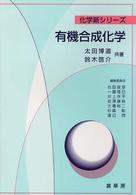- ホーム
- > 洋書
- > 英文書
- > Politics / International Relations
Full Description
Thinking World Politics Otherwise is a different kind of textbook. It includes a variety of critical approaches and perspectives that seek to challenge and rethink orthodox understandings of International Relations.
Moving away from traditional approaches based on theoretical and historical schools of thought, Thinking World Politics Otherwise brings together prominent voices in the field that recognize the importance of engaging with global politics from a range of perspectives and through a variety of cutting-edge approaches. It provides students with the opportunity to become familiar with a wide spectrum of approaches, issues, and cases that have been historically marginalized in the discipline.
Key Features
· Includes a variety of approaches that have been historically marginalized in the discipline.
· Each section editor, as an expert in the approach represented in their section, provides an introduction to the section to give readers an overview of the approach.
· Diverse topics and chapters, ranging from understanding how the everyday shapes our view of the world to a planetary examination of international mobility, provides students with a wide range of learning opportunities.
· Also available as an e-book with functionality, navigation features, and links that offer extra learning support.
Digital formats and resources
Thinking World Politics Otherwise is available for students and institutions to purchase in a variety of formats and is supported by online resources.
The e-book offers a mobile experience and convenient access along with self-test multiple choice questions, functionality tools, navigation features, and links that offer extra learning support: www.oxfordtextbooks.co.uk/ebooks
The digital version, available on Politics Trove, is also accompanied by online resources.
These include:
For lecturers:
- PowerPoint slides with a deck for each chapter to help build lecture materials
Contents
1: Jonneke Koomen and Salome Ayuak: Learning about World Politics: The What and the HowKnowing World Politics Rhys Crilley: Introduction 2: Joanna Tidy: The everyday 3: Dean Cooper-Cunningham: Discourse 4: Precious N. Chatterje-Doody: Narrative 5: Lisa Bogerts and David Shim: Visuality 6: Kristin Anabel Eggeling: Practice 7: Naomi Head, Clara Eroukhmanoff, and Amanda Beattie: EmotionsPostcolonial and Decolonial Approaches Nivi Manchanda: Introduction 8: Musab Younis: International History 9: Lisa Tilley: Race/economy 10: James Eastwood and Sharri Plonski: Settler colonialism 11: Kerem Nisancioglu: Connection/Relation 12: Sara Salem: The internationalFeminist Approaches Laura J. Shepherd: Introduction 13: V. Spike Peterson: Privilege 14: Shweta Singh: Security and Militarism 15: Perdita Sonntag, Karinda Flavell, and Samanthi Gunawardana: Global Political Economy 16: Cecilia Åse: The State 17: Alba Boer Cueva, Lenka Olejnikova and Laura J. Shepherd: GenderQueer Approaches Caitlin Biddolph and Cai Wilkinson: Introduction 18: Catherine Charrett and Mohamed Abdou: Religion 19: Amanda Álvares Ferreira: The body politic 20: Caitlin Biddolph: International Law and Justice 21: Ryan Thoreson: Human Rights 22: Julia Richardson and Cai Wilkinson: SecurityPlanetary Approaches Stefanie Fishel: Introduction 23: Joana Castro Pereira: Ecology 24: Benjamin Meiches: Violence 25: Anthony Burke: Ecological Law 26: Danielle Celermajer: Justice 27: Samid Suliman and Kaya Barry: International Mobility








